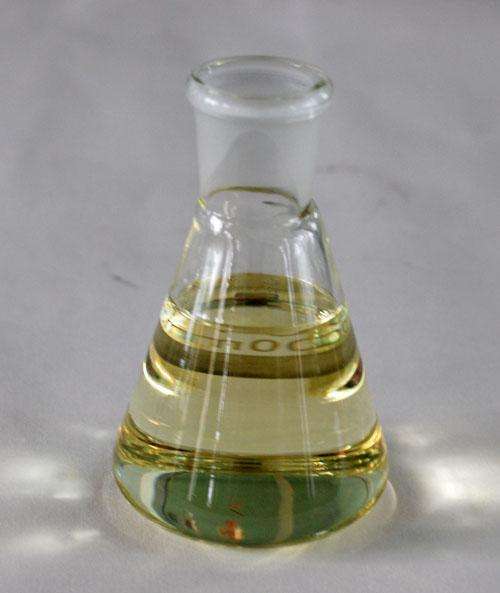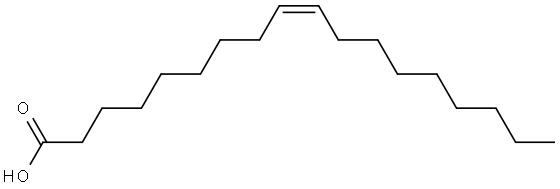Preparation and use of oleic acid
Feb 18,2022
Background and overview
Oleic acid is an unsaturated fatty acid with carbon-carbon double bonds in its molecular structure, and is a fatty acid that constitutes olein. One of the most common types of naturally occurring unsaturated fatty acids. Oil hydrolysis can obtain oleic acid, and the glycoside of oleic acid is one of the main components of olive oil, palm oil, lard and other animal and vegetable oils. Oleic acid has cis-trans isomers, and natural oleic acid is a cis-structure (trans-structure cannot be absorbed by the human body), which has a certain effect on softening blood vessels, and also plays an important role in the metabolism of humans and animals, but the human body itself Synthetic oleic acid cannot meet the needs and must be ingested from food, so it is good for health to consume cooking oil with a high content of oleic acid. Industrial products often contain 7-12% saturated fatty acids (palmitic acid, stearic acid) and a small amount of other unsaturated fatty acids (linoleic acid). Pure oleic acid is a colorless oily liquid with the odor of animal or vegetable oil, which gradually darkens when placed in the air for a long time. Specific gravity 0.895 (25°C). Freezing point 4 ℃. Boiling point is 286 °C (13,332 Pa). Refractive index 1.463. Insoluble in water, soluble in ethanol, benzene, chloroform, ether and other organic solvents. When exposed to the air, especially when it contains some impurities, it is easily oxidized, the color becomes yellow or brown, and it has a rancid odor. Decomposes when heated to 80-100°C under normal pressure. Airtight, dark storage.

Preparation method【1】
To commercial propylene glycol (46.48 kg) were added [NAOH] (1.94 kg) at room temperature. The resulting mixture was heated at [160°C] for 20 minutes into a 200 L stainless steal reactor under a nitrogen atmosphere and with vigorous agitation. Commercial raw linseed oil (4.19 kg) was added under a nitrogen atmosphere. The mixture was heated at [160°C] for 2 hours under a nitrogen atmosphere and with vigorous agitation. After cooling to [80°C,] the reaction mixture was directly acidified with an aqueous solution of [H2SO4] (0.06 % w/w, 47.5 kg). After standing for about 10 minutes, the top layer was washed with a NaCI aqueous solution (5% w/w, 47.25 kg). The top layer was removed, dried and stored [AT-80°C] under nitrogen.
Mixed fatty acids can be prepared by the above method, and then separated and refined. First, a crude fraction was carried out by distillation, and the distillation was carried out under reduced pressure (0.133×10 3 to 1.07×10 3 Pa). Maintain the distillation temperature not to exceed 260°C. The distilled fatty acids are further rectified using their boiling point difference. Depending on the melting point of various fatty acids, it can be purified by a crystallization method. It can also be purified by solvent extraction.
Use
It is used to make soap, lubricant, flotation agent, ointment and oleate, etc. It is also a good solvent for fatty acids and oil-soluble substances. It can also be used for precision polishing of precious metals and non-metals such as gold and silver, and polishing in electroplating industry.
Oleic acid is an organic chemical raw material. It can be epoxidized to produce epoxy oleate, used as a plasticizer for plastics, and oxidized to produce azelaic acid, which is the raw material of polyamide resin. In addition, oleic acid can also be used as pesticide emulsifier, printing and dyeing auxiliaries, industrial solvent, metal mineral flotation agent, Chemicalbook release agent, etc. It can also be used as raw material for the production of carbon paper, ball oil and typing wax paper. Various oleate products are also important derivatives of oleic acid. As a chemical reagent, it is used as a chromatographic comparison sample and for biochemical research to detect calcium, copper, magnesium, sulfur and other elements.
For the preparation of other pharmaceutical intermediates or chemicals.
references
【1】WO2004013078
- Related articles
- Related Qustion
- A substance rich in many foods - oleic acid Nov 21, 2023
Oleic acid is the most widely distributed natural fatty acid and is present in practically all lipids.
- The Uses of Oleic Acid Nov 24, 2022
The passage introduces the uses of Oleic Acid.
Bisphenol A is a diphenylmethane derivative with two hydroxyphenyl groups. Bisphenol A (BISPHENOL A) is a colorless solid that is used in the synthesis of commercial plastics, including polycarbonates....
Feb 18,2022Organic Synthesis IntermediateDesflurane is the most recent volatile agent to enter mainstream anaesthetic practice. It has been welcomed for surgical techniques where a fast onset and rapid recovery from anaesthesia are particularly desirable.....
Feb 18,2022APIOleic acid
112-80-1You may like
- Oleic acid
-

- $100.00 / 50kg
- 2024-10-31
- CAS:112-80-1
- Min. Order: 1kg
- Purity: 99%
- Supply Ability: 5000Ton
- Oleic acid
-

- $50.00/ kg
- 2024-10-31
- CAS:112-80-1
- Min. Order: 1kg
- Purity: 99%
- Supply Ability: 5000kg/Month
- Oleic acid
-

- $3.50 / 1kg
- 2024-10-31
- CAS:112-80-1
- Min. Order: 1kg
- Purity: ≥99%
- Supply Ability: 300tons/month





